A small group of women gathered in a cafe overlooking the Strule river last Thursday, the hazy sunlight which poured through the windows catching on their colourful coattails and bright, sequinned scarves.
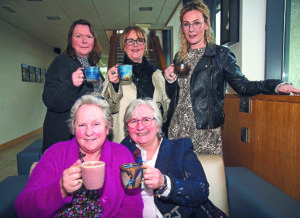
Some were so sharply dressed that you would have thought them ready for a night out on the town, while others were more comfortably clothed.
As they sat and stood around, filling each other’s cups and chatting with the easy familiarity of old friends, an imaginative onlooker might have thought of a thousand different theories explaining how and why these women had been brought together in the Strule Arts Centre that morning.
A civilised birthday party… The AGM of some refined club or society… Perhaps a charity tea morning to raise money for people less fortunate than themselves?
However, any guess based on the way these women looked would surely have been doomed to inaccuracy; the relaxed, happy, vibrant appearance they gave off belied the grim reality which united them.
Each of these women are living – and will die – with secondary breast cancer.
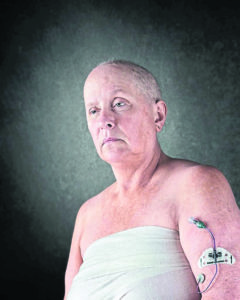
Secondary breast cancer is an incurable form of breast cancer that has spread to another part of the body.
Often – but not always – people who receive a secondary breast cancer diagnosis have previously had primary breast cancer. However, where in the case of primary breast cancer, a successful treatment plan can lead to the eradication of of the disease and a subsequent full recovery, those who receive a secondary diagnosis can be certain that they will never hear the words ‘all clear’.
This was the reality that affected almost all the women present at the Strule Arts Centre last Thursday morning.
“Only one in five of us will live five years beyond our diagnosis,” explained one woman. “It is the biggest killer in the UK of women between the ages of 35 and 64.”
These women had been brought together by the grim misfortune they shared.
But, in addition to that, they were united by a desire to improve the services system that cares for people with secondary breast cancer.
Through a project of art and activism called ‘Seen To Be Heard’, these women had given themselves a voice.
They had gathered in Omagh to make that voice heard to the public, as well as to key stakeholders with the power to improve the beleaguered, fumbling and inadequate services that are supposed to support people with secondary breast cancer locally.
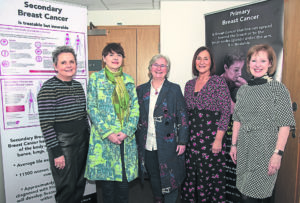
‘Seen To Be Heard’ is the brainchild of a woman named Jennifer Willis – an award-winning photographer from Belfast who had a powerful exhibition on the theme displayed in the Strule Arts Centre for the last month.
The project – which seen over 20 women with secondary breast cancer bare their bodies and souls before Jennifer’s camera – has been hailed not only for its artistic merit, but also for its potential to inform and improve policy around the way this incurable cancer is funded, researched and treated.
The exhibition was raw, powerful and deeply affecting in its capacity to convey the reality of what it is to live with secondary breast cancer.
And, equally as impressive as the depth, empathy and complexity with which the women’s portraits speak, has been the exhibition’s ability to function as an engine for activism around the disease.
To bring a close to the exhibition, the participants – all of whom can speak from personal experience about the cruel shortcomings and life-degrading inadequacies within secondary breast cancer services in the North – sat down to a panel discussion last Thursday to thrash out some of the most important ways they believe the secondary breast cancer services could be transformed.
By exposing their bodies, sharing their stories, and becoming involved in the conversation around this much-avoided subject, each woman has played their part in any forthcoming revolution in how we as a society treat secondary breast cancer – and the people who live and die with it.
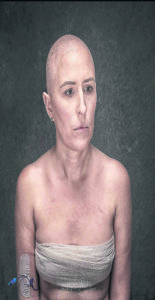
At the front of the space was a long table with four seats facing out towards the small crowd.
These four chairs soon became populated by the panel – photographer, Jennifer Willis, Genevieve Irvine from SWELL, Leslie Finlay from Macmillan Cancer, and Dr Helen McGarvey, a lady who spent much of her life lecturing in nursing and now lives with secondary breast cancer.
The panel introduced themselves and a film started rolling against a projector screen which hung above the heads of the panelists.
Many of the women present appeared on the screen, exposing their bodies, and their lives.
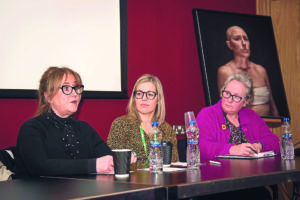
As the film started rolling, soft music played, and the following words appeared upon the screen; ‘Our worlds as we know them end when we receive our diagnosis. The average survival rate for stage four breast cancer is two to three years. For some subtypes, the average is actually 13 months’.
Secondary breast cancer does not form part of the audit of health care services here in the North, meaning that little data is collected with the view of tailoring and improving services.
As a result, it is currently unknown how many people are living with secondary breast cancer in the North.
However, as a direct result of the ‘Seen to be Heard’ Campaign, Cancer Focus NI has pledged to fund a secondary breast cancer audit. This should be a crucial step in ensuring that data informs policy, clinical practice and support of people living with Secondary Breast Cancer here in the North.
It is also the case that fewer treatment options are available here than in England, Scotland and Wales, and, while in theory it is possible to get access to treatment trials, the reality is not so simple.
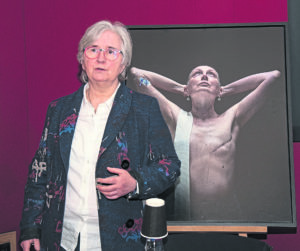
To be identified for a trial requires a lot more specialist infrastructure than is currently available in NI, and any involvement in one would necessitate frequent travelling to mainland UK. Such an upheaval whilst living on continuing treatment,
As of July 2022, there was no-one in the North on a clinical drug trial.
There is only one specialist breast cancer nurse in the whole of the North.
‘31 women die everyday from secondary breast cancer, yet we are a mere acknowledgement in a single paragraph of 72 pages in the ‘NI 10 year Cancer Strategy’.
Though all of the women who attended the event last week felt, to varying degrees, failed by the health system, they hope that their actions will mean future generations of people are given the support they need and deserve.
And, while public attendance at the discussion was relatively low, assurances were made by representatives from Macmillan Cancer Support and Fermanagh and Omagh District Council that concrete action would be taken to help improve services for local people affected by secondary breast cancer.







